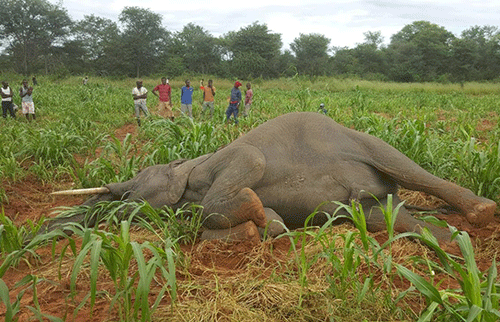A local insurer is considering extending coverage to the agricultural industry and compensating farmers impacted by natural calamities such as droughts and wildlife conflict.
Namibia Special Risks Insurance Limited (Nasria) last week stated that it is conscious of the possibility of becoming obsolete in the insurance market if it does not innovate. Thus, it seeks to offer solutions which go beyond conventional special risk insurance coverage.
The company’s acting managing director John Uusiku said the business has made significant investments in the creation of new insurance products. Weather index-based livestock insurance (WIBLI) is one of the new products expected to enter the market before the end of the year.
“This is a product that is set to revolutionise the agricultural sector. It is going to cover two natural extremities. On one hand, it will cover drought, and on the other hand it will cover floods or excessive rainfall,” he said during the company’s unveiling of its updated corporate identity.
Nasria is the only insurer in Namibia which provides cover against damage to property and consequential loss caused by, amongst others, riots or civil commotion, strikes, lockouts and labour disturbances.
The product is annually insured, and intended for both communal and commercial cattle farmers. Uusiku observed that these ground-breaking products will support government’s efforts to combat the hazards of climate change. The human-wildlife conflict (HWC) insurance product is the second item, and is anticipated to be released at the beginning of next year.
The product is now being created in collaboration with the environment ministry. The risk of the ever-growing conflict between people and wildlife or wild animals is intended to be reduced by this solution.
“We remain committed to continuously improve and stay ahead. We will continue to explore emerging technologies to ensure that our customers receive the best possible coverage and support or after- sales support,” Uusiku assured.
Meanwhile, environment minister Pohamba Shifeta recently shared statistics and compensation amounts in the National Assembly that government had spent on human-wildlife conflicts since April this year.
“Human-wildlife conflict is a serious issue within our communities. The situation is worsened by recurring droughts across the country, leading to increased competition over resources and space between people and wild animals. Other factors contributing to this include the continued encroachment by human in wildlife habitats,” he shared.
Incidents of conflict between people and wildlife continue to be a serious issue. These occurrences mostly result in infrastructural damage, livestock losses, crop damage and in some tragic cases, fatalities and human injuries.
The ministry created a national policy, which was updated in 2018 and first adopted in 2009, to manage and address this impact.
The policy calls for offset payments for community losses and damages. The ministry has since 2019 paid over N$24 million in offset amounts for damage caused by wild animals. As a result, from 2019 to the present, the ministry has paid N$2.5 million for crop damages, N$640 000 for human injuries, and N$3.3 million for fatalities.
The ministry also handled 33 claims for loss of life during that time, of which 15 were in 2022 and four in 2023 by April 2023, with crocodiles, hippos and elephants being the primary offenders, Shifeta stated.
In terms of crop damages, 2 637 hectares were destroyed by wild animals, of which 270 hectares were documented in 2022 and 60 hectares by April 2023, mostly caused by elephants.
Moreover, a total of 862 livestock were killed by predators, mainly crocodiles, hyenas, lions, wild dogs, leopards and jackals, of which 204 were recorded in 2022 and nine in 2023.
According to the Namibia Statistics Agency (NSA)’s data, Namibia is already feeling the impact of a looming drought. The crop farming sub-sector experienced a contraction of 55% during the second quarter of 2023, relative to a sluggish growth of 0.2% posted in the parallel quarter of 2022. The performance is associated with the drought experienced during this period.
Vice President Nangolo Mbumba said while addressing a high-level human-wildlife (HWC) conflict indaba this year that HWC should not be the responsibility of the government and the line ministry alone.
“The impact of this conflict on people and their property is a difficult challenge that conservation agencies and institutions such as the Ministry of Environment, Forestry and Tourism are facing,” he added.
Mbumba said conservancies are now benefiting 245 000 people in various regions.
He thus called upon the national conference to review and discuss progress, challenges and opportunities in the implementation of policies for specific resolutions and actions to implement preventative, protective and mitigative strategies for HWC management.


